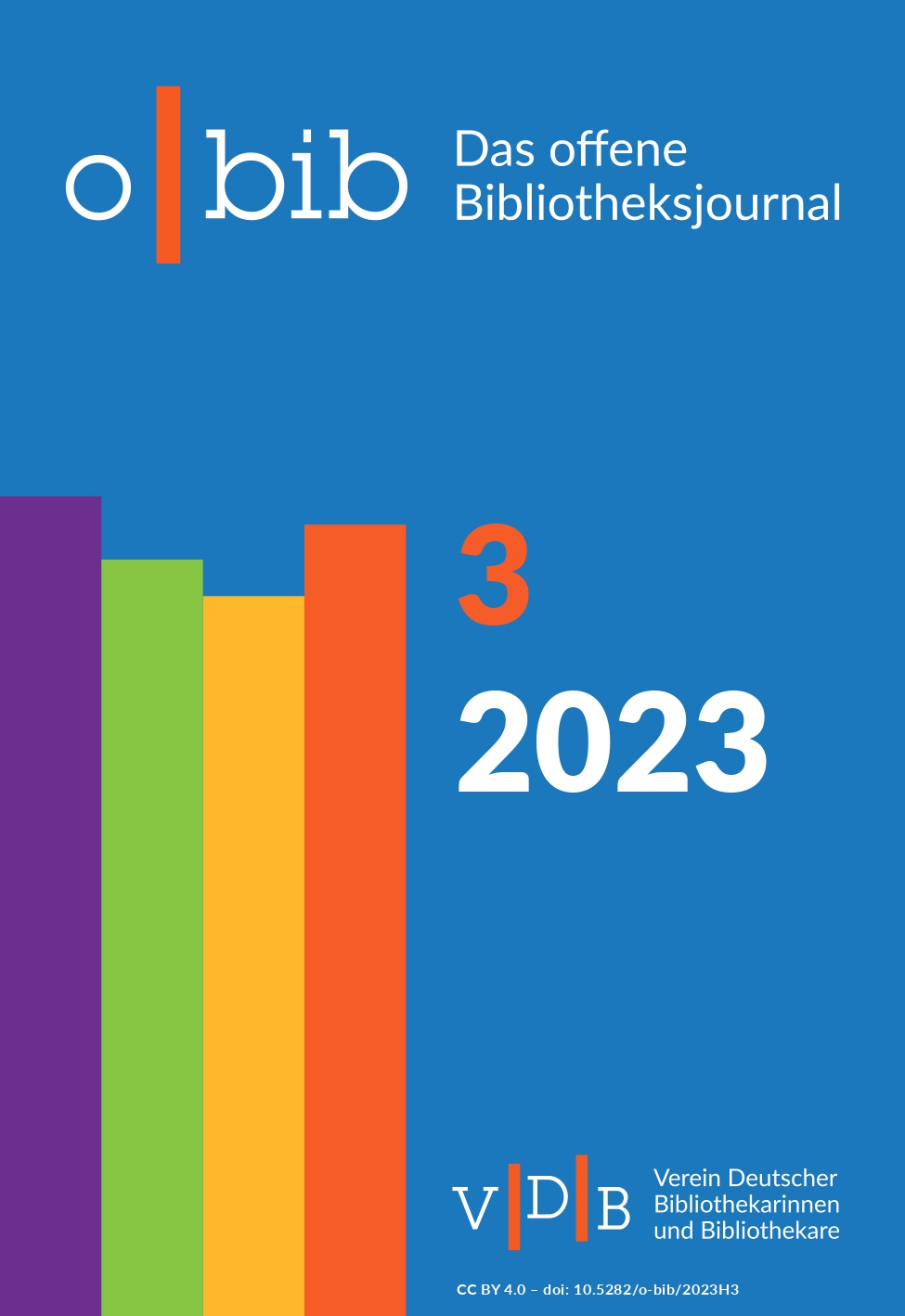Nachhaltigkeit in sechs Handlungsfeldern
Ein Kriterienkatalog als praktischer Leitfaden bei der Erarbeitung von Nachhaltigkeitskonzepten für wissenschaftliche Bibliotheken
DOI:
https://doi.org/10.5282/o-bib/5944Keywords:
Libraries, Academic libraries, Sustainability, Sustainable development strategy, Collection of examplesAbstract
Sustainability is a highly relevant topic not only for society, but also in higher education institutions. For academic libraries, too, as service providers and internal institutional actors, taking part in sustainability efforts of their institution is becoming increasingly relevant. Based on a general discussion of the importance of sustainable development and the role that libraries can play in this context, a catalog of criteria is presented. It shows the fields of action for sustainability for academic libraries in a structured manner, with recommended measures for practical implementation based on various indicators. The catalog thus functions both as a strategic framework model and an operational toolbox.
References
Aldrich, Rebekkah S.; Beton, Susan; Schaper, Louise; Scherer, Jeffrey A.: Sustainable Hinging. Passageway to Better Buildings, Budgets and beyond, in: Hauke, Petra; Latimer, Karen; Werner, Klaus Ulrich (Hg.): The Green Library – Die grüne Bibliothek. The Challenge of Environmental Sustainability – Ökologische Nachhaltigkeit in der Praxis, Berlin/Boston 2013 (IFLA Publications 161), S. 15–37. https://doi.org/10.1515/9783110309720.
Antonelli, Monika: The Green Library Movement: An Overview and Beyond, in: Electronic Green Journal (27), 2008. https://doi.org/10.5070/G312710757.
Armstrong, Howard: The Role of the Library in Environmental Education, Bellingham 1971. https://eric.ed.gov/?id=ED102047, Stand: 22.05.2023.
Czolkoß-Hettwer, Michael: Überlegungen zur Implementierung von Nachhaltigkeitsstrategien an wissenschaftlichen Bibliotheken, in: BIT online – Bibliothek, Information, Technologie 23 (6), 2020, S. 573-580. https://www.b-i-t-online.de/heft/2020-06-index.php, Stand: 22.05.2023.
Deutscher Bibliotheksverband e.V.: Deutsche Nachhaltigkeitsstrategie der Bundesregierung – der Beitrag der Bibliotheken zur Umsetzung der Agenda 2030 der Vereinten Nationen. Stellungnahme des Deutschen Bibliotheksverbandes (dbv), Berlin 2016. Online: https://dbv-cs.e-fork.net/sites/default/files/2020-11/2016_07_31_dbv_Stellungnahme_Nachhaltigkeit.pdf, Stand: 22.05.2023.
Deutscher Bibliotheksverband e.V.: Bericht zur Lage der Bibliotheken 2018/19, Berlin 2019. Online: https://www.bibliotheksverband.de/publikationen, Stand: 22.05.2023.
Deutscher Bibliotheksverband e.V.: Bericht zur Lage der Bibliotheken 2020/21, Berlin 2021. Online: https://www.bibliotheksverband.de/publikationen, Stand: 22.05.2023.
Feess, Eberhard: Treibhauseffekt, in: Gabler Wirtschaftslexikon, Wiesbaden 2018. Online: https://wirtschaftslexikon.gabler.de/definition/treibhauseffekt-51434/version-274601, Stand: 22.05.2023.
Ghorbani, Mahboubeh: Designing a Green Library Evaluation Checklist. Green Library Award 2018 Submission. Online: https://www.netzwerk-gruene-bibliothek.de/wp-content/uploads/pdf/Ghorbani_2018.pdf, Stand: 22.05.2023.
Hauke, Petra: Nachhaltigkeit – (k)ein Thema für Bibliotheken?!, in: Bibliothek Forschung und Praxis 45 (3), 2021, S. 373-393. https://doi.org/10.1515/bfp-2021-0062.
Molitor, Heike; Ibisch, Pierre L.: Nachhaltigkeit als Reaktion: Was bisher geschah, in: Ibisch, Pierre L.; Molitor, Heike; Conrad, Alexander u.a. (Hg.): Der Mensch im globalen Ökosystem. Eine Einführung in die nachhaltige Entwicklung, München 2018, S. 35–58.
IFLA Section Environment, Sustainability and Libraries Standing Committee: Action Plan 2021–2023. https://repository.ifla.org/handle/123456789/1828, Stand: 22.05.2023.
IPCC: Zusammenfassung für die politische Entscheidungsfindung, in: Masson-Delmotte, V.; Zhai, P.; Pirani, A.; Connors, S.L.; Péan, C.; Berger, S.; Caud, N.; Chen, Y.; Goldfarb, L.; Gomis, M.I.; Huang, M.; Leitzell, K.; Lonnoy, E.; Matthews, J.B.R.; Maycock, T.K., Water field, T.; Yelekçi, O.; Yu, R.; Zhou, B. (Hg.): Naturwissenschaftliche Grundlagen. Beitrag von Arbeitsgruppe I zum Sechsten Sachstandsbericht des Zwischenstaatlichen Ausschusses für Klimaänderungen, Bonn/Wien/ Bern 2021. https://doi.org/10.48585/zmpb-kk68.
Karioja, Elina: How to Evaluate Libraries’ Sustainability? An Approach to an Evaluation Model and Indicators. Paper Presented at IFLA WLIC 2013 Singapore. Online: http://library.ifla.org/114/1/115b-karioja-en.pdf, Stand: 22.05.2023.
McBane Mulford, Sam; Himmel, Ned A.: How Green is My Library?, Santa Barbara 2010.
Mumm, Gerrit: Die deutsche Nachhaltigkeitsstrategie. Grundlagen – Evaluationen – Emp fehlungen, Wiesbaden 2016.
Noh, Younghee; Ahn, In-Ja: Evaluation Indicators for Green Libraries and Library Eco Friendliness, in: International Journal of Knowledge Content Development & Technology 8 (1), 2018, S. 51-77. https://doi.org/10.5865/IJKCT.2018.8.1.051.
Padilla Segara, Melanie: Let’s Go Green! Entwicklung eines Zertifikats für „Grüne Bibliotheken“ am Praxisbeispiel der Stadtbibliothek Stuttgart, Masterarbeit, Hochschule der Medien, Stuttgart 2015.
Padilla Segarra, Melanie; Hauke, Petra: Die Grüne Bibliothek. Ökologische Nachhaltigkeit bei Bibliotheksbau und -ausstattung, in: Hauke, Petra; Werner, Klaus Ulrich (Hg.): Praxishandbuch Bibliotheksbau. Planung – Gestaltung – Betrieb, Berlin/Boston 2016, S. 30–41. https://doi.org/10.1515/9783110403183.
Portugal, Katharina: Von anderen lernen. Bibliothekarische Verbandsinitiativen zur Errei chung der UN-Nachhaltigkeitsziele im deutschsprachigen Raum, in: Bibliothek Forschung und Praxis 45 (3), 2021, S. 394-400. https://doi.org/10.1515/bfp-2021-0072.
Pufé, Iris: Nachhaltigkeit, Konstanz/München 20173. https://doi.org/10.36198/9783838587059.
Rehberger, Emilie: Nachhaltigkeit in Bibliotheken. Umsetzungsszenarien an der Universitätsbibliothek Eichstätt-Ingolstadt im Kontext des universitären Nachhaltigkeitsgesamtkonzepts, Bachelorarbeit, Hochschule für den öffentlichen Dienst in Bayern, München 2022.
Rehberger, Emilie: Kriterienkatalog Nachhaltigkeit in wissenschaftlichen Bibliotheken, Zenodo, 2023, https://doi.org/10.5281/zenodo.8224124, Stand: 10.09.2023.
Schillings, Sonja: Warum es nicht funktioniert. Klimaanpassung und die Öffentliche Bibliothek, in: BuB, Forum Bibliothek und Information 74 (4), 2022, S. 168–170.
Schmitt, Berthold: Netzwerk „Grüne Bibliothek“ gegründet, in: KulturBetrieb 7 (1), 2018, S. 48. Online: http://www.kulturbetrieb-magazin.de/bisherige-ausgaben/ausgaben-2018/, Stand: 22.05.2023.
Schumann, Tim: Urban Gardening und Makerspaces als neues Arbeitsfeld Öffentlicher Bibliotheken und Beitrag zur Stadtentwicklung. Masterarbeit, Köln 2017. Online: https://www.netzwerk-gruene-bibliothek.de/wp-content/uploads/pdf/Schumann_2017.pdf, Stand: 22.05.2023.
Stoltenberg, Ute; Burandt, Simon: Bildung für eine nachhaltige Entwicklung, in: Heinrichs, Harald; Michelsen, Gerd (Hg.): Nachhaltigkeitswissenschaften, Berlin/Heidelberg 2014, S. 567-594. https://doi.org/10.1007/978-3-642-25112-2_17.
Wagner, Janet; Schumann, Tim; Riesenweber, Christina: Libraries4Future – über die Initiative und Best Practices, in: LIBREAS, Library Ideas 38, 2020. https://doi.org/10.18452/23473.
Williams, Beth Filar; Charney, Madeleine; Smith, Bonnie: Growing Our Vision Together: Forming a Sustainability Community within the American Library Association, in: Sustainability: Science, Practice and Policy 11 (2), 2015, S. 57–69. https://doi.org/10.1080/15487733.2015.11908147.
World Commission on Environment and Development: Report of the World Commission on Environment and Development: ”Our common future“, New York 1987. https://digitallibrary.un.org/record/139811, Stand: 22.05.2023.
Downloads
Published
Issue
Section
License
Copyright (c) 2023 Emilie Rehberger

This work is licensed under a Creative Commons Attribution 4.0 International License.





